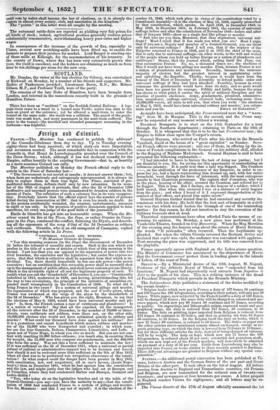IRELAND.
Belfast, the manufacturing capital of Ireland, has long been pre- paring for the double honour of a visit from the Lord-Lieutenant and from the British Association. The Earl and Countess of Eglinton left Dublin on Tuesday morning, and reached Belfast in the afternoon, accompanied by the Lord Chancellor and the Attorney-General and Solicitor-Gene- ral. In the evening, the Mayor and Town-Council of Belfast celebrated the Viceroy's arrival in "the capital of Ulster," by bidding him to a grand banquet in the Music Hall. Here, ranged round the tables, under the presidence of Mr. Samuel Fenton the Mayor, were—the Chancellor of Ireland, the Archbishop of Dublin, the Marquis of Downshire, President of the Royal Flax Society; the Earl of Antrim, the Earl of Enniskillen, Vice-President of the British Association; the Earl of Dunraven, Lord Naas, Secretary for Ireland ; Lord Rossmore, Lieutenant County Mona- ghan; the Earl of Belfast, Deputy Lieutenant; Lord Dufferin, President of the School of Design; Sir Robert Bateson, Dr. Denvir, Roman Catholic Bishop ; the Reverend J. Bleckley, Moderator of the General Assembly; the Mayor of Liverpool; Sir Roderick Murchison ; Colonel Sabine, Presi- dent of the British Association; several Vice-Presidents and gentlemen known to the locality. Dinner having ended, the oratorical part of the ceremony commenced, and it was kept up with great spirit until midnight. The principal speakers were the Lord-Lieutenant, the Lord Chancellor Lord Naas, and Mr. Napier. The tone of the speeches was that of delight, with the usual tendency to compliment observable at most of these festal gather- ings. All the speakers testified to the, immense improvements which have been made in Belfast during the last seven years.
Next day, Lord Eglinton visited the Queen's Colleges ; where an address was presented to him by Dr. Henry, the President. In his reply, Lord Eglinton did not speak out quite so emphatically as he did at Gal- way; but, after expressing his conviction that education is the basis of all that is good and great in a nation, he said—
"it is my earnest hope that this College will grow in the estimation of the people, as the benefits derived from it become every day more apparent ; and that it will become the centre of intellectual enlightenment, as well as the best promoter of an increased feeling of harmony and good-will among the inhabitants of this country."
The first meeting of the General Committee of the British Association for the Advancement of Science was held on Wednesday, in the Queen's College. Sir Roderick Murchison presided, in the absence of Mr. Astro- nomer Airy. The General Secretary, Mr. John Phillips, read the report of the proceedings of the Council during the past year. It embraced a variety of matters, including the organization of the society in sections, and the balance-sheet. The funds received during the year amount to 16911., and the expenditure to 1452/. s leaving a balance in hand of 2391.
In the evening, a general meeting in the May Street Church brought together all the notables : the Lord-Lieutenant, Archbishop Whately, the Prince of Canino, the Earl of Iznnicadllen, Lord Naas, the Lord Chancellor' Sir David Brewster, and many clergymen of all denomina- tions. As Professor Airy was unwell, he had delegated to Sir Roderick Murchison the duty of introducing Colonel Sabine to the meeting as their future President ; and that ceremonial having been performed, Colonel Sabine took his post and delivered his inaugural address. It was of great length, and dwelt mainly on topics drawn from the applicate sciences. When this important proceeding terminated, after a vote of thanks to Colonel Sabine, the meeting was adjourned until Friday.
All through the week, the town has been gay and bustling. Troops have been marching to and fro, with their bands playing and flags flying, in all directions.
Mr. Sharman Crawford, defeated in the county of Down, was enter- tained at a "grand banquet" by his Tenant-right supporters at New- townards, on Monday evening. Besides the chief guest, there were pre- sent, Mr. Frederick Lucas, Dr. Coulter, Dr. Manight, and several other gentlemen of native notoriety. The speaking was nearly all of a local character, relating to the coercion used by the landlords at the late elec- tion. Many letters were read from distant sympathizers ; among them one from "R. Cobden," dated Midhurst, August 20. There is a point beyond the usual apology in Mr. Cobden's letter—a glimpse of his future political policy.
"One word of a practical kind. The contest in which you have lately been unsuccessful has been characterized by an unusual exercise of coercive influence, on the part of the landlords, over the tenantry. I am told that individual cases can be easily proved in which the hearts of electors were known to be on your side while they were forced to poll for your opponents. I wish you to appoint a committee for the purpose of collecting facts of this kind, and putting them on permanent record, so as to be available in fight- ing the battle for the only remedy for such abuses of power—the ballot. Individual cases, when well authenticated, will do more than abstract argu- ments, however logical, to carry public opinion in favour of this, the sole mode of affording protection to the voter. I look upon a wider extension of the franchise, or more frequent elections, without the ballot, to be only plans for diffusing over a still larger portion of the people the sufferings and op- pressions which now characterize our electoral contests. For my own part, when Free-trade and Protection are no longer political battle-cries, I shall look forward with intense interest to the day when a really liberal and popu- lar party shall organize itself with the pledge never to abandon the field
until vote by ballot shall become the law of elections, as it is already the custom in almost every society, club, and association in the kingdom." The " points " in this letter were all caught by the meeting.
The autumnal cattle-fairs are reported as yielding very fair prices for all kinds of stock ; indeed, agricultural produce generally realizes prices substantially remunerative, notwithstanding heavy poor-rates and higher wages.
In consequence of the increase of the growth of flax, especially in Ulster, several new scutching-mills have been fitted up, to enable the farmers to prepare their produce for market. Lord Bangor is erecting one of those mills at Killough, for the accommodation of his tenantry. In the county of Down, where flax has been very extensively grown this year, the yield is excellent, and the holders are obtaining as much as from nine to ten shillings per stone for the new crop.



























 Previous page
Previous page